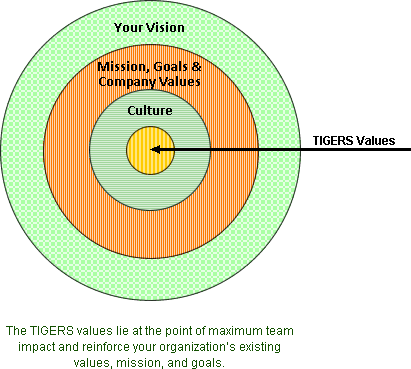In 1987, I wanted to know what contributes to building a committed, productive, quality-focused, collaborative and successful team. After launching an extensive review of studies in the business, education and psychology group dynamic disciplines, six values for forming effective teams surfaced. The six values are trust, interdependence, genuineness, empathy, risk and success. They form the acronym, TIGERS.
The six values are represented by behaviors that support creativity, harmony, a commitment from team members to exceed expectations, and the desire to learn. They also contribute to group synergy and group loyalty and, therefore, improve employee retention.
I also discovered that ethical, quality-focused, productive and successful groups would rather collaborate than compete against fellow team members. The findings also suggested that the six TIGERS values – trust, interdependence, genuineness, empathy, risk and success — support collaboration over internal competition. For team based organizations, this means that the TIGERS values also support an organization’s existing core values and form the heart beat of a collaborative, group-centered culture.
Empathy, Genuineness and Interdependence, for example, are difficult concepts for highly competitive people to wrap their minds around. If the tough get going when the going gets tough — if it’s my way or the highway — if climbing the ladder of success is a dog-eat-dog process — if climbing the ladder is the only way to achieve the power and freedom to make change — if employees are a necessary evil to leverage work and, therefore, must be managed and told what to do — if survival of the fittest is the rule of the game — why would listening to employees with the desire to understand their perspective when it is different from the status quo make sense?
Likewise, from an organizational view, the TIGERS values give teams a competitive edge over groups that are internally competitive. One reason is that internal competition sets the stage for someone to win and for someone to lose. People don’t like to lose. This is especially true if the loss affects their sense of dignity, self respect, and the group’s morality. Over time, resentment builds and the losers who stick around for job security find ways to win — often at the group’s expense.
Maybe they show up for work each day just to do what is required to stay employed. Maybe they get even with a supervisor by taking spontaneous sick days so work scheduling is a nightmare. Maybe they don’t share what they know because it is too risky. Maybe they competitively up the ante and unionize to bargain collectively against management. Maybe they blow the whistle. When there is a stalemate, internal competitors often resolve to compromise which means no one gets what they want. Everyone loses a little — until the next time.
Conversely, another reason a collaborative team holds a competitive edge is that people like to win. Collaboration sets the stage for mutual wins. This means that attention is paid to standards; group process; group procedures; collaborative values like trust, interdependence, genuineness, empathy, risk and success; and superior group maintenance skills.
You might be thinking, “Well, this is all sounds good, but is it reliable and valid?”
Yes. In our next post, learn about the TIGERS Validation Study.
